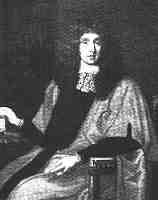 |
Jeffreys was born
in Denbighshire, Wales, on May 15, 1645, and educated at the University of Cambridge and
the Inner Temple, London. He was called to the bar in 1668. Jeffreys's brilliance and
eloquence soon won him a large private practice. He enjoyed the favour of a number of
influential courtiers and managed to gain employment in the confidential legal business of
King Charles II . In 1677 he was
knighted and appointed Solicitor General to the Duke of York and Albany, later King James
II . In 1680 he became chief justice
of Chester and, in 1683, Lord Chief Justice of England and a member of the Privy Council
|
